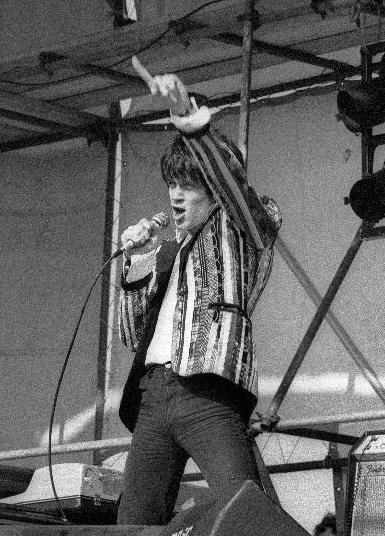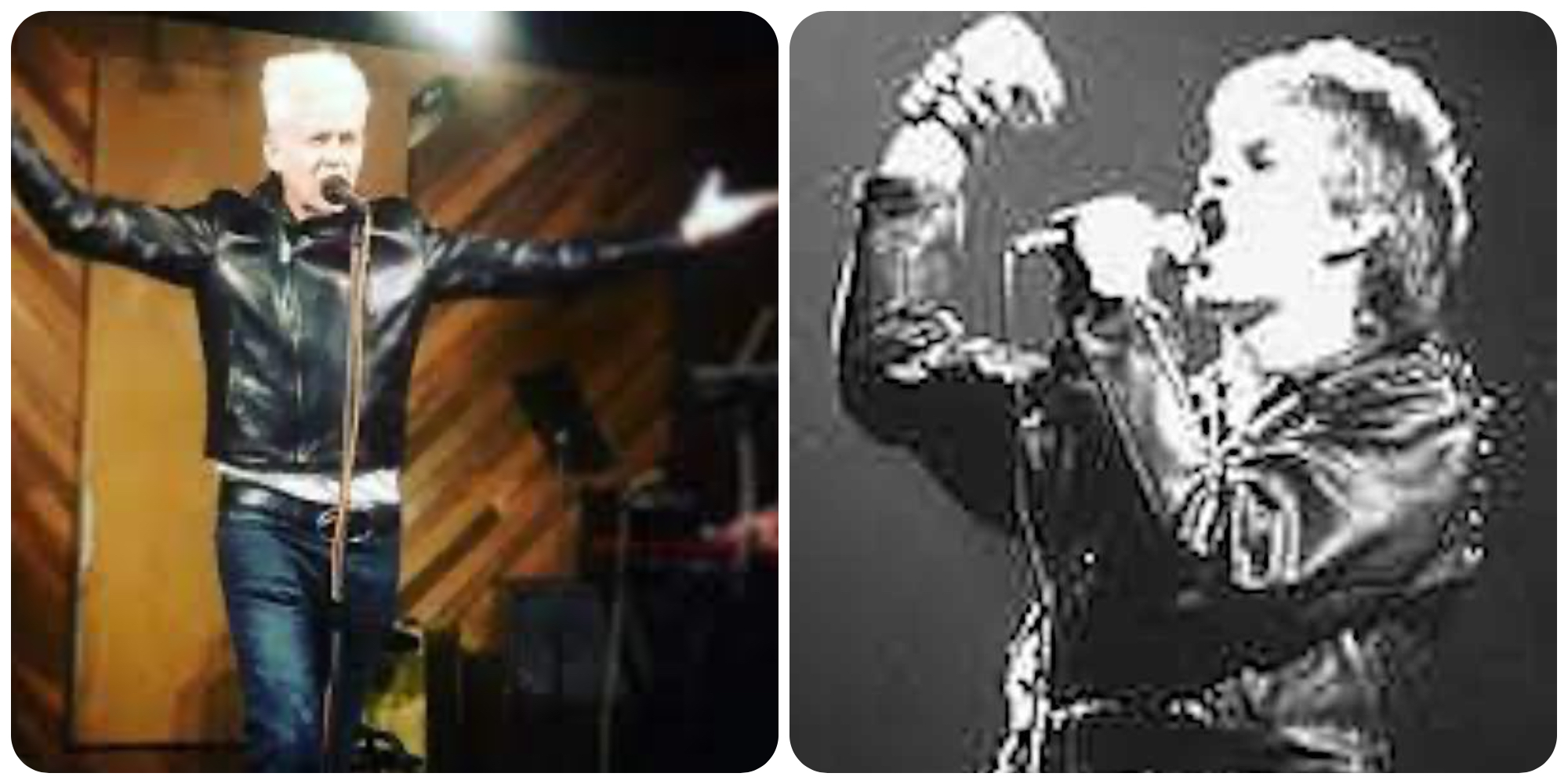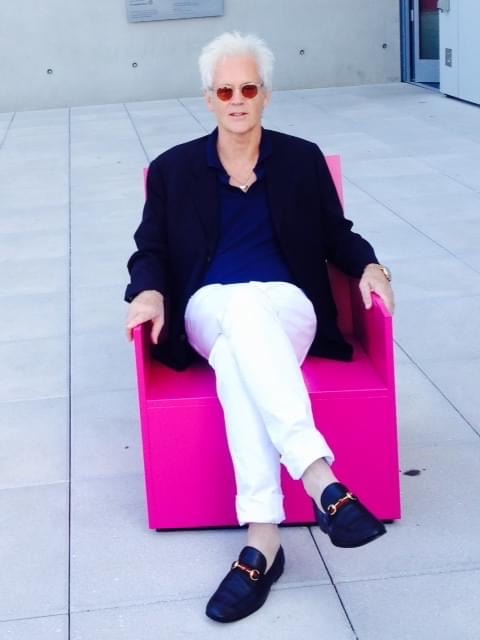
It’s 1978 and David Philp, frontman of up and coming punk upstarts The Automatics, seemingly has it all.
The band’s single When The Tanks Roll Over Poland Again is sitting at the top of the Punk/New Wave charts and the the quartet is signed to major label Island Records.
But almost overnight a change of leadership at the record company deals a deathly blow to the Automatics’ dreams of stardom.
Island throw their support behind a bunch of Irish hopefuls called, er, U2 and The Automatics are dumped before the release of what would be their debut album Walking With The Radio On.
Dismayed, the band rapidly implodes and Philp decamps to LA to rebuild his life.
And that would have been the end of the story, but for the intervention of some determined Japanese punk revivalists – some 20 years later.
Here Philp tells An Ideal For Living‘s Matt Catchpole about his extraordinary musical revival, the risks of being a punk in the violently tribal late ’70s and why a spot of guerilla marketing put Freddie Mercury‘s nose firmly out of joint.

A fan of rock ‘n’ roll artists like Gene Vincent, Philp was among a host of proto punks who hung around Barry Jones‘ basement apartment studio in London.
“The Pistols came through there, The Damned came through, recording. Although everything that came out of that studio at that point was fairly wobbly, it was fun. And there’s something in the air, you know? And later, people gave it a name.”
That name was Punk and Philip would get his first taste of fronting a punk band with The Boys, before hooking up with Wally Hacon, Bobby Collins and Ricky “Rocket” Goldstein to form The Automatics.
It was at the basement studio that Philp met Steve Lillywhite, who would go on to become a big name producer with credits including Talking Heads, Peter Gabriel and the aforementioned U2.
Lillywhite, then a tea boy and tape op at Phonogram, became a friend and flatmate of Philp’s, taking advantage of dead time at the studios to produce the Automatics’ early demos.
Philp would also lend a hand as a tape op, helping out on recordings by the original line up of Ultravox led by John Foxx.
“John used to come round to the flat in Comeragh Road and settle down and play my old Gibson Aaron guitar.
“All these guys would be around from the scene that Steve was building, like Johnny Thunders, Eddie and the Hot Rods and then most of us went to Island together.
“It was a kind of alternative scene to the Kings Road scene of The Pistols and The Clash, Vivienne Westwood and Malcolm McClaren.”
Thunders and Philp became friends – The Heartbreakers‘ frontman playing guitar on The Automatics’ album sessions and Philp singing on Thunders’ solo album So Alone.
“He was really a sweet guy. But at the time that I knew him, he was just falling off into the unknowable. When people become unknowable because of the drugs that they do, and it’s not really them anymore.
“Johnny would come round the apartment, then put on The Stones’ Some Girls. He was really into Some Girls. And then he’d go into the bathroom and shoot up, which bothered me a bit.”
The Automatics played all the top London punk venues such as The Roxy and The Vortex, but Philp retains a special affection for The Marquee Club.
“We had a residency at the Marquee which gave us an opportunity to build up a following. And that was really special.
“There was just this great kid energy, a barely suppressed anger at the world. And, you know, from the first downbeat, it was just this huge ignition.

“The kids were all packed in and they’re all jumping up and down at the front in the mosh pit. The whole place was covered in smoke and there was no oxygen, but just a great atmosphere. They were unforgettable gigs.”
While punk shows could be jubilant affairs, they could also land you in hospital.
In the early days certainly, violence and punk rock went hand in glove.
Even walking down the street in tight jeans and spiky hair could be seen as a provocation in a tribal youth culture populated by Mods, Rockers, Teddy Boys and Skinheads.
“I remember walking down the Kings Road and a couple of a couple of Teddy Boys having a go at me with bike chains.
“They were swinging these chains, so I got between two cars so they couldn’t swing them, but one of them got me, knocked me cold,” Philp says.
“Whilst all this was going on, there was a there was police car right across the road watching it happen. You know, we were beyond the law. We were beyond the protection of the law. We ‘deserved everything that we got’. And it was tribal wars.”
‘Very quickly we had to stop playing and start fighting’
Punks in ’76 and ’77 were very much in the minority and the controversy wrought by groups like the Sex Pistols only served to increase the public outrage.
“At this time, people just hated punks, you were more likely to get beaten up than paid if you played.” Philp remembers.
“People today say: ‘Oh I was there pogoing in ’76’ – well maybe 10 per cent of them were – the rest are telling bumpers. It was not a popular thing to be a punk rocker at that time and it was hard.”
To get a bit of name for themselves The Automatics would rig up a generator and play live on the back of a flatbed truck.
“Once, we drove down Kings Road and It was okay while we were at the punk end, you know, World’s End. But then as we came into Sloane Square, all the traffic backed up and we were stuck right outside the big Ted pub.
“it was like poking a beehive and this whole crowd of Teds came out of this pub just enraged, waving bar stools and cricket bats and god knows what. Very quickly, we had to stop playing and start fighting to try and stop them getting on the truck.
“Suddenly the traffic cleared and we were able to get a straight run down to Sloane Square. But we were very lucky to survive that one.”

It was a similar guerilla gig, that got Freddie Mercury fuming.
While Queen were playing a show at the Empire Pool, Wembley, The Automatics got on their flatbed truck to play the car park outside.
Philp takes up the story….
“The night before we had somebody go round sticking up our posters, saying “Tonight at the Empire Pool Wembley, The Automatics’. And then in very small writing at the bottom ‘Special Guest Queen’.
“So just as Queen were ending, we started up in the car park and we got through about three or four songs before the police came along.”
Years later, Philp bumped into a member of Queen’s road crew, who said Mr Bulsara was not amused.
“He said Freddie was apoplectic,” laughs Philp. “Because the Evening Standard’s reviewer had thrown his review over to us saying; while Queen was overblown, here was this bright young band bashing out raw, honest rock’n’roll in the car park.”
The Automatics best known anthem When The Tanks Roll Over Poland Again was in part written as a dig at some of Philp’s fellow punks’ flirtation with the Far Right.
Perhaps encouraged by some punks’ appropriation of the swastika, groups like The National Front and The Greater Britain Movement were seeking to forge links with the young rebels.
Philp himself was actually approached by Martin Webster of GBM.
“The stuff he sent me was absolutely horrible, racist. Just un-fucking-forgivable,” Philp shudders.
A keen student if history, Philp harnessed his righteous anger to write The Tanks…. and the song went to the top of the Punk/New Wave charts.
However that success would be shortlived as a changing of the guard at Island Records signalled the beginning of the end for the first phase of the Automatics.
“What happened at Island was the managing director got fired and the new managing director came in. And, you know, you don’t make your predecessor look like a genius by breaking his acts. You get rid of them all,” Philp explains.
“So they got rid of us and a bunch of other ones, and off they went with U2, fortunately for them,” he smiles.
So while his bandmates joined other groups, Philp got married and moved to LA, where he all but gave up hope of reviving the Automatics as a meaningful enterprise.
Then, in the mid-90s, he bumped into Goldstein who generously handed over some notebooks he’d kept during The Automatics’ heyday.
Big In Japan
Philp’s PA put some of the pages up on the internet and it was to prove a life-changing decision.
“All of a sudden there was this bunch of emails from kids all over the world, which was quite amazing because I thought we’d been completely forgotten.”
One of those who got in touch was a Japanese fan, who happened to know the head of Base Records in Tokyo.
They struck a deal to release The Automatics’ shelved debut album and 20 years on, a stunned Philp was invited to join a punk revival tour.
Philp was initially reluctant, but was persuaded by his wife who’d previously lived in Japan and was keen to see old friends.
Backed by Japanese musicians, who’d learned the songs off by heart despite speaking little English, Philp found himself getting a buzz for live performance again.
“It turned out to be really a wonderful, magical couple of weeks. And it was the same deal as the Marquee Club, you know, from the first downbeat these little Japanese punks flying through the air.”
Back in LA, Philp revived The Automatics with a fresh line-up and began writing and releasing new music again.
Britannia an album of songs about his home country written from the point of view of an ex-pat was particularly well received.

Ex-Radio 1 DJ Mike Read proved to be a keen supporter and Philp’s songs frequently ride high on his Heritage chart, where listeners can vote for their favourite releases.
“I’ve had a nice little resurgence recently, and I’m very grateful for that,” Philp says modestly.
At the time of writing the new Automatics single Wild Ride Through Wonderland is at No18 on the chart, up eight places from the previous week.
Naturally the new Automatics music is rather less raucous than his punk days, although near neighbour Steve Jones of The Pistols did guest on a couple of tracks.
“I saw him the other day actually,” Philp says casually. “He looked great, he’s obviously been taking care of himself.”
The Automatics Mark 2 has now been existence for more than 20 years and Philp shows no sign of slowing down.
“I’m never not writing a song,” he says. “I’m always chewing things over, obsessing about what rhymes with this line and that line. That’s what you do, I guess, when you’re a songwriter.”

Philp’s Wild Ride of a career did not escape the attention of producers in nearby Hollywood and he’s made a few bob selling the rights to his life story.
“We took the money from ABC, DreamWorks Focus Features and I thought, man, so long as this movie never gets made, I’m golden,” Philp laughs. “But recently we took the money from a company called Landline Pictures, and they actually seem quite keen to to make it.”
Asked who he’d like to play him in the film of his life story, he, perhaps wisely, swerves the question, politely saying he’ll pass on any suggestions.
But what of the original Automatics – is he still in touch with his old band?
“Oh yeah,” he says enthusiastically. “Ricky’s in London, and I pretty much always see him when I’m back. He went on and played in Sham 69 and and a bunch of other bands besides.
“Wally went off on the Stiff World tour and he married a girl from New Zealand. So he’s over there. Nobody really knows what happened to Bob. But he did turn up about 20 years ago.”
And why does he think there’s still such an interest in that first wave of punk rockers more than 40 years on.
“It’s kind of interesting because, you know, at the time, I don’t think any of us ever thought there was going to be anything coming out of it. We didn’t really know how to play, we were learning.
“But what I did like about the whole English thing at the time was, you know, it was strip everything down to its component parts – verse, chorus, verse, chorus, – bridge if you’re lucky – no solo – chorus, chorus, you’re done. And hopefully you’ve got three minutes of magic.
“It was much more important to be different than it was to be good. And that’s something that today’s kids could learn. It’s more important to be different than it is to be good.”
- The Automatics Wild Ride Through Wonderland, featuring Neil Frost is out now and available from Apple Music
- For more about The Automatics and David Philp visit their website, Facebook and Twitter pages